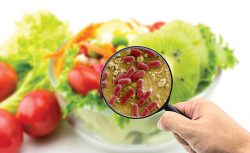- Advertisement -

Popular
Food Safety for Grilling Ground Beef
Ready to start grilling hamburgers? Bacteria is of special concern with ground beef - because when beef is ground - more of the meat surface is exposed to potential harmful bacteria. For this reason, ground beef must be cooked to an internal temperature of 160°F, so as to kill all the bacteria and avoid foodborne illness.
Food Safety for Seafood
The safe handling of seafood is essential to reducing the risk of foodborne illness. Follow basic food safety tips for buying, preparing, and storing fish and shellfish — so you and your family can safely enjoy the fine taste and good nutrition of seafood.
Harmful Foodborne Bacteria
Bacteria are a member of a large group of unicellular microorganisms - some of which can cause human disease. Although most bacteria are harmless or often beneficial, some bacteria are pathogenic, or those that can pose a threat to human health or cause illness. Bacteria and viruses are responsible for most foodborne illnesses and are the biggest threat to food safety.
Safe Cooling of Food
TCS (Time/Temperature Control for Safety) food is a high risk food that requires specific time and temperature controls to remain safe for consumption. When cooling this type of food, the temperature must be reduced from 135°F to 41°F or lower - within 6 hours.
Food Safety for Chicken
Raw chicken and poultry may contain harmful bacteria and washing it does not remove the bacteria. This bacteria can also be spread to other items and food - if proper procedures are not followed. The only way to kill bacteria on chicken is by cooking it to a safe internal temperature - as measured by a food thermometer.
























